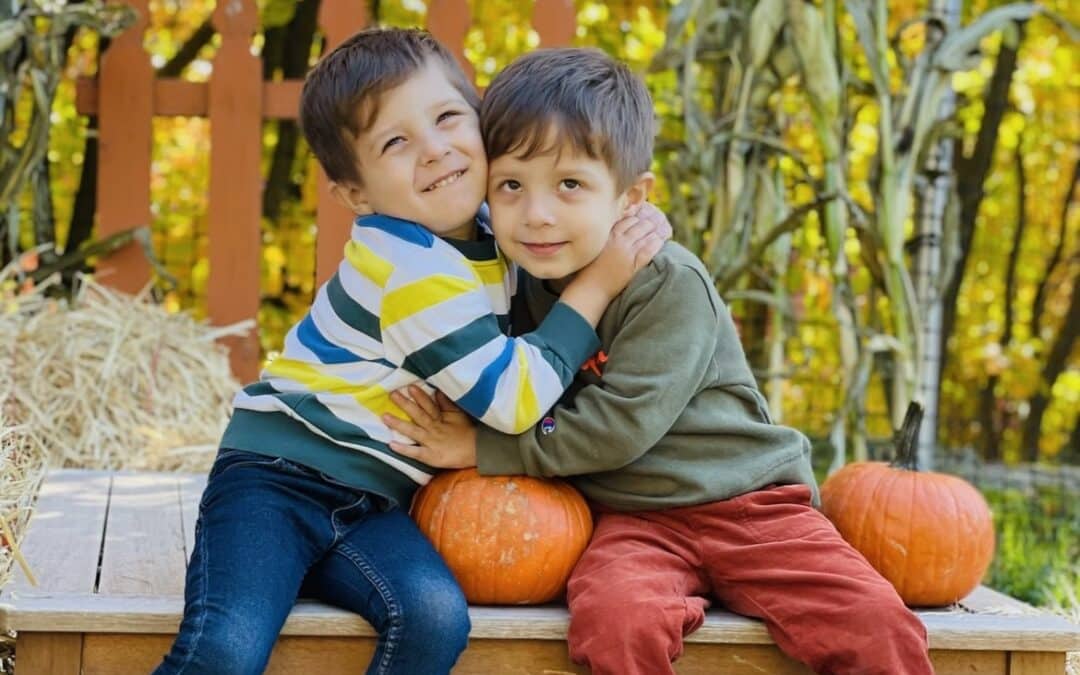“Children’s behaviors are inconsistent and no child shares, helps, or comforts all the time. Children are humans and humans are not perfect.”
What You’ll Learn
- What is prosocial behavior?
- Why are prosocial skills important?
- How do I encourage my child’s prosocial behavior?
Raising a child is already difficult enough, but to raise a “good” human? Daunting, to say the least. On the bright side, I am positive that you are already doing this and are not just raising a “good” human, but a thriving one. Here are some of my suggestions on how you can continue empowering your child to thrive through modeling, practicing, and praising prosocial behavior.
Prosocial Behavior
Prosocial behavior is intentional behavior that benefits others. The skills most often associated with prosocial behavior include:
- Empathy
- Comforting
- Kindness
- Helping
- Compassion
- Cooperation
- Sharing
- Gratitude
- Caring
Prosocial behavior increases with age. In the first few years of life, even babies begin to learn and demonstrate prosocial behavior through small acts to show their consideration of others. Around the age of two, children start to develop an even deeper understanding of how others think, feel, and experience the world around them. Children at this age begin to see others’ thoughts, feelings, and experiences as important.
It is important to remember that prosocial behavior not only differs among age groups, but also among individuals. Children’s behaviors are inconsistent and no child shares, helps, or comforts all the time. Children are humans and humans are not perfect.
Prosocial Skills → Thriving Humans
Prosocial skills are linked to children’s social and emotional health, which directly affect their overall development and learning. Teaching and encouraging prosocial skills helps children thrive. Prosocial skills often lead to:
- Fulfilled social lives
- Effective problem-solving
- High emotional intelligence
- Positive relationships
- Strong sense of belonging
- Increased motivation and participation
- High executive functioning
- Enhanced learning and academic performance
In addition to these individual benefits, prosocial skills are linked to societal advantages including increased positive attitudes and support toward stigmatized groups.
Encouraging Prosocial Behavior
Prosocial skills are learned and this learning starts in the presence of warm and sensitive adults. When these skills are modeled and practiced within the context of a nurturing relationship, children are more likely to demonstrate prosocial behavior in their daily interactions with other adults and peers. Here is how you can encourage prosocial behavior at home:
Model → Children are VERY observant and will mimic you. Do your best to model what you want your child to do—treat people kindly, share, volunteer, help others, and talk about others’ feelings.
- Remember: You are never expected to do this perfectly, 100% of the time. It is okay to mess up. Acknowledge your mistakes and move forward!
Practice → Children need varied and frequent opportunities to practice prosocial behavior.
- Try this: Include your child in simple acts to help the family, such as allowing them to set the table for dinner. This promotes kindness and helping.
- Try this: Read books that represent different points of view or emotions. While reading, point out any prosocial skills that the characters demonstrate. Ask questions or share your thoughts on the characters’ actions, feelings, and what you would do if you were in a similar situation. This promotes empathy and caring.
- Try this: During dinner time, have each member of your family share something or someone they are grateful for. This promotes gratitude.
- Try this: Help your child reflect on how their behavior affected someone else, without judgment. “I heard the dog make a noise when you pulled her tail. How do you think she feels? What can we do to make her feel better?” This promotes empathy and comfort.
Praise → When children are recognized for their efforts, bravery, growth, and kindness, they are more likely to continue practicing these skills and recognize these traits in others. Remember to offer authentic praise when you see your child participating in prosocial behavior.
- Try this: “Can you please pass me the blanket? Thank you, that was so helpful!” or “That was really kind of you to share your stuffed animal when your friend was feeling sad.”
Empowering Takeaways
- Prosocial skills help children thrive socially and emotionally.
- Children can learn prosocial skills, but no child can be expected to demonstrate these skills all the time.
- Prosocial behavior can be encouraged through efforts of modeling, practice, and praise.
Be vibrant and keep thriving!
This article was last reviewed or updated on October 6, 2023.
References
Abramson, A. (2021, November 1). Cultivating empathy. Monitor on Psychology, 52(8). https://www.apa.org/monitor/2021/11/feature-cultivating-empathy
Beachboard, C. (2019). Promoting prosocial behaviors in the classroom. Edutopia. https://www.edutopia.org/article/promoting-prosocial-behaviors-classroom/
Brazzelli, E., Grazzani, I., & Pepe, A. (2021). Promoting prosocial behavior in toddlerhood: A conversation-based intervention at nursery. https://pubmed.ncbi.nlm.nih.gov/33341017/
Child Care Education Institute. (2023). Prosocial behavior in early childhood. https://www.cceionline.com/prosocial-behavior-in-early-childhood/
Eisenberg, N. (1992). The Caring Child. Harvard University Press.
Raising Children Network. (2022, January 7). Prosocial behaviour: Children and teenagers being helpful and valuing others. https://raisingchildren.net.au/toddlers/behaviour/encouraging-good-behaviour/prosocial-behaviour-kindness-children-teens



